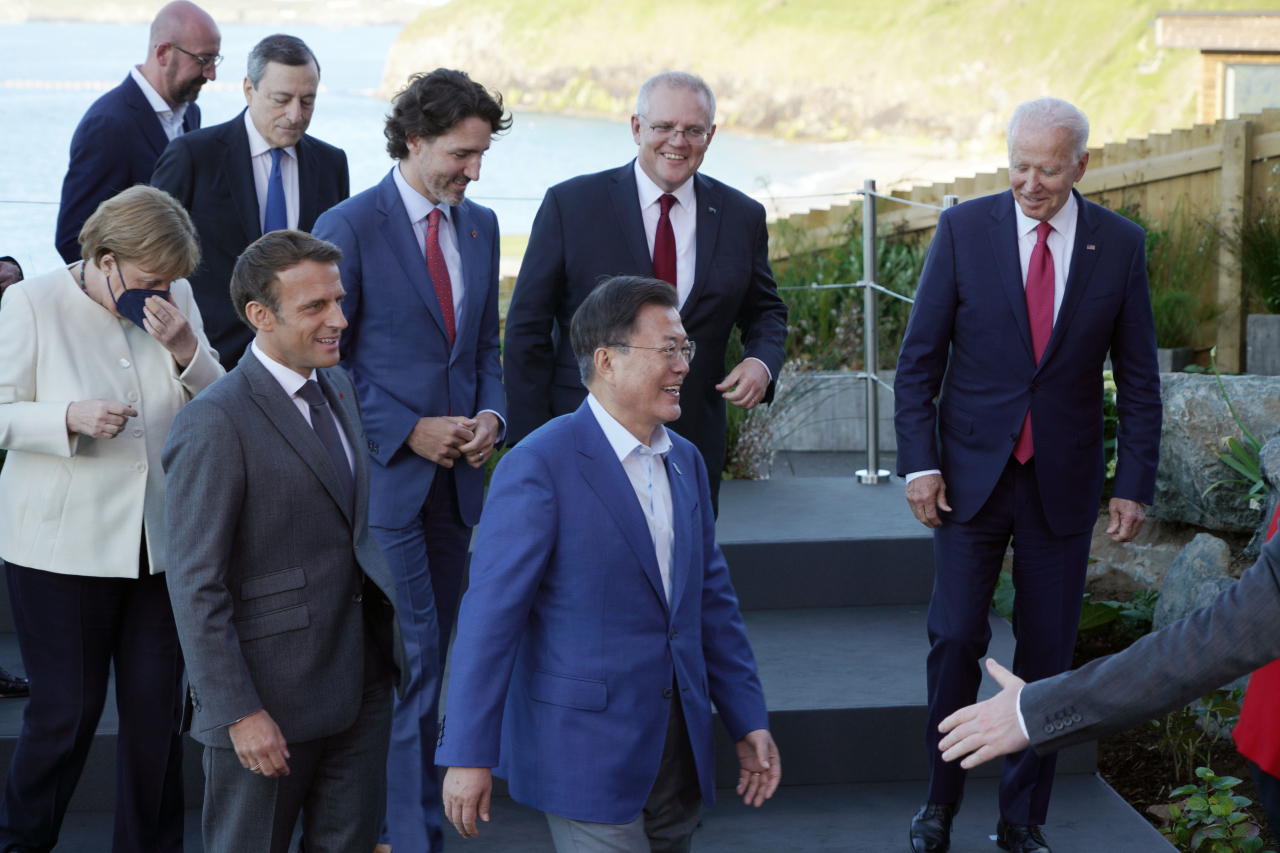CORNWALL, England/SEOUL -- Korea’s invitation to the G-7 summit signifies that it has risen to the ranks among developed countries standing shoulder to shoulder with global leaders, Cheong Wa Dae said Saturday.
The Group of Seven is an organization of leaders from some of the world’s biggest economies: Canada, France, Germany, Italy, Japan, the United Kingdom and the United States. The G-7 members meet annually to discuss global issues and coordinate policies.
Hosted by the UK, this year’s G-7 summit also invited the four leaders from Australia, India, South Korea and South Africa -- a shorter guest list than the 2009 meeting when leaders from 20 countries were invited. Korea was invited to the global leaders’ summit for a second consecutive year.
As the G-7 meeting marked the first multilateral in-person summit since the COVID-19 pandemic began, with the purpose of coping with pressing issues such as economic recovery and climate change, the invitation shows Korea’s higher reputation on the world stage, the presidential office said.
According to Cheong Wa Dae, British Prime Minister Boris Johnson said in his letter of invitation that Korea’s participation is important in discussing a better way of rebuilding for all, preventing future pandemics, protecting free trade, responding to climate change and cooperating for sustainable development goals.
On Sunday, President Moon Jae-in held one-on-one talks with Johnson. They discussed the two sides’ continued cooperation and ways to enhance their bilateral relationship.
Reviewing the free trade agreement between Korea and the UK that came into effect at the beginning of the year, the two leaders vowed to maintain and develop economic ties.
Moon and Johnson shared the same perspectives on the importance of equitable vaccine supply for the world to overcome the COVID-19 pandemic, Cheong Wa Dae said, and they agreed to explore ways to expand cooperation in areas such as vaccine development for swift response and fair distribution.
Also on the sidelines of the G-7 summit, the Korean leader held bilateral talks with leaders from Australia, Germany and the EU.
Moon and Australian Prime Minister Scott Morrison on Saturday agreed to enhance the relationship between the two countries, as they commemorate the 60th anniversary of establishing diplomatic ties this year.
Morrison said Australia’s hydrogen energy production and Korea’s hydrogen car technology can create synergy, according to Cheong Wa Dae.
Moon expressed hopes for developing cooperation projects to couple Australia’s renewable energy with Korea’s technologies in the hydrogen car and battery sector.
As both countries were invited to the G-7 summit, the two leaders acknowledged that their participation reflects the global leaders’ high expectations for the two countries’ role in resolving worldly problems in the post-coronavirus era.
Moon later met with German Chancellor Angela Merkel. They started off their bilateral talks by giving positive evaluations of both countries’ antivirus efforts.
The two leaders agreed to find ways to cooperate in ensuring fair access to vaccinations for every country and to expand vaccine production and supply, Cheong Wa Dae said.
During the meeting with the German leader, Moon shared the results of his recent summit with US President Joe Biden on North Korean issues, saying that Seoul is actively trying to resume talks with Pyongyang.
According to Cheong Wa Dae, Merkel said she has more sympathy than anyone about the division of the Korean Peninsula, as she grew up in East Germany, adding that Berlin will continue to provide support and cooperation regardless of the results of the federal election slated for September.
Talks were also held with European Council President Charles Michel and European Commission President Ursula von der Leyen.
They discussed ways to overcome COVID-19, cooperate on climate change and environment and develop trade partnerships between Korea and the EU.
The EU leaders offered their congratulations for Korea’s successful 2021 P4G Seoul Summit last month, and Moon thanked the EU for its participation, Cheong Wa Dae said.
Proposing a closer partnership in the future, Moon said the EU’s excellent competency in low-carbon economy and renewable energy can create synergy with Korea’s prowess in the eco-friendly vehicle technologies, energy storage and the battery sector.
The Korean leader called for efforts to bolster vaccination efforts for developing countries, saying it is necessary to combine the European abilities of vaccine development and Korea’s production abilities to expand vaccine production bases.
Korea will faithfully serve the role of a global vaccine hub and contribute to strengthening global health governance, Moon said, according to Cheong Wa Dae.
At this year’s G-7 summit held from Friday to Sunday in the southwestern county of Cornwall, Moon is attending three sessions of expanded discussions covering health, socioeconomic issues, as well as climate change and environment.
By Kan Hyeong-woo (
hwkan@heraldcorp.com) and Joint Press Corps





![[Exclusive] Hyundai Mobis eyes closer ties with BYD](http://res.heraldm.com/phpwas/restmb_idxmake.php?idx=644&simg=/content/image/2024/11/25/20241125050044_0.jpg)
![[Herald Review] 'Gangnam B-Side' combines social realism with masterful suspense, performance](http://res.heraldm.com/phpwas/restmb_idxmake.php?idx=644&simg=/content/image/2024/11/25/20241125050072_0.jpg)

